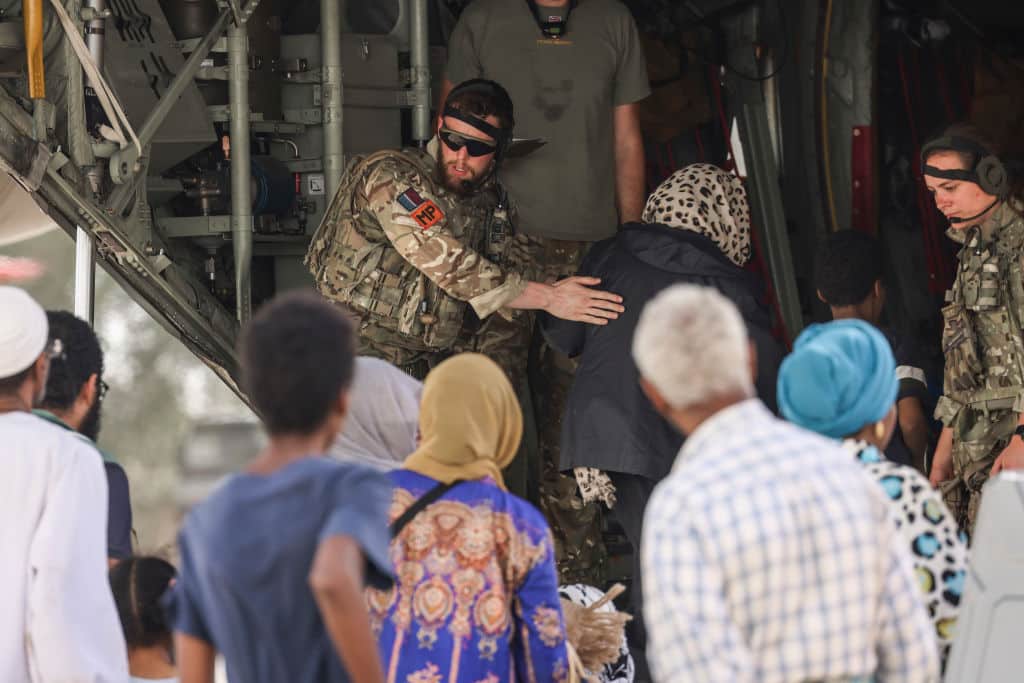An armed conflict headed by the armed forces chief, General Abdel-Fattah Burhan, and the head of the Rapid Support Forces paramilitary group, General Mohamed Hamdan Dagalo, began on April 15 in Sudan. The conflict rages on in the capital city of Khartoum and the Darfur region, where at least 460 people have been killed and 4,063 people have been injured, reports the country’s Health Ministry. Foreign states are fast evacuating their citizens from Sudan.
Noon Abdelbassit Ibhrahim, a 21-year-old medical student at Ibn Sina University in Khartoum, Sudan, was living in Burri before a missile struck outside her family home on day four of the conflict gripping Sudan.
“It hit right outside our door, all our glass windows and doors shattered, our house was basically destroyed and we left it in a state where it’s open and anyone can get inside. All our belongings, all our life is there. And we left everything behind to try and get to safety,” a distraught Abdelbassit Ibhrahim says to FORBES AFRICA on a WhatsApp call.
The family left the house in Burri on Friday, April 21, arriving in the Egyptian capital of Cairo two days later.
At first, they stayed with a relative in Soba, a suburb on the outskirts of Khartoum. The family organized a bus to take them to Cairo, traveling with Swedish, American and Irish friends. The whole bus trip cost a total of SDG2,000,000 ($3,322).
Loading...
Halfway through the journey, at 8PM, they were stopped by officers and told it would be better to turn back and sleep at a nearby city, as there was the imminent threat of hijackers on their way. The group decided to continue and drive through the night.
When they arrived safely at the Egyptian border after many hours of travel, the women, children and elders were allowed in without a visa. The American, Swedish, and Irish citizens were issued a visa on arrival for $25, Abdelbassit Ibhrahim says.
Her brother, Mohamed Abdelbassit Ibrahim, 19, as well as her uncles, Moez Hassan Zain, 40, and Momein Hassan Zain, 34, were turned away at the border because they didn’t have the right paperwork, she says.
Abdelbassit Ibhrahim has not been in contact with her brother or uncles since Sunday and is worried about them.
Internet outages have been reported across the country.
“The situation in Sudan is escalating by the minute. It’s completely unsafe, and they still haven’t declared a state of emergency. People are running out of food, water. People can’t get to the hospital to get emergency services and those that can – all these hospitals are going out of service because they have no staff and no equipment. We’re very slowly losing contact with everyone.”
The death toll is believed to be higher because people are struggling to get healthcare, as most of the city’s hospitals have been forced to close. The World Health Organization (WHO) has so far recorded 11 attacks on health facilities in the country.
“Hundreds and apparently now thousands of people are stuck at the border and can’t cross over –people who don’t have passports, people whose passports have expired, men aged 16 to 49 who can’t get their visas issued. The situation is just very chaotic and not enough light is being shone onto this.
People still don’t know what’s going on. This is a point in time where we really do need food, water and medical supplies,” says Adbelbassit Ibhrahim to FORBES AFRICA.
The armed forces and the Rapid Support Forces seemingly agreed upon several ceasefires, the latest being a three-day break in fighting over the Muslim holiday of Eid al-Fitr, which started on Friday. The ceasefires have largely been ignored.
The UN reports that up to 20,000 people, predominantly women and children, have escaped from Sudan to Chad.
A total of 77 South African citizens were trapped in Sudan, according to South Africa’s Head of Public Diplomacy, Clayson Monyela.
“Our nationals and embassy staff are on their way out of Khartoum. I can’t disclose the security and logistics of the operation. But they are moving out. We are in constant contact with them,” says Monyela on Twitter, on April 24.
Forty one South Africans have been bussed out of Sudan through the Egypt border along with seven Angolans, as part of a multi-South African government department effort on Monday, reports The Gift of the Givers. The organization, along with the South African government, organized the evacuations, but cell phone networks are down and hindering efforts.
The remainder of the South Africans were evacuated on Tuesday, April 26, reports The Gift of The Givers.
An increasing number of countries have evacuated diplomats and citizens from Sudan’s capital as the conflict continues. The United States, United Kingdom and Canada have flown diplomats out, reports the BBC. France, Germany, Italy, Spain and India have also been removing diplomats and other nationals.
Turkey began evacuation efforts by road on Sunday, with plans halted due to a nearby “explosion”. The citizens of Gulf countries, as well as of Egypt and Pakistan were evacuated, reports the BBC.
On Sunday, lines of UN vehicles were seen leaving Khartoum heading towards Port Sudan on the Red Sea, carrying “citizens from all over the world”, a Sierra Leonean refugee told AFP.
In recent months, Sudan had been attempting to transition towards democracy, after the 2019 coup of autocrat Omar al-Bashir. The Rapid Support Forces and the armed forces were both held responsible for the military coup.
If the conflict continues without aid or a ceasefire, it will have ramifications for the horn of Africa as the region enters yet another year of drought.
Loading...
